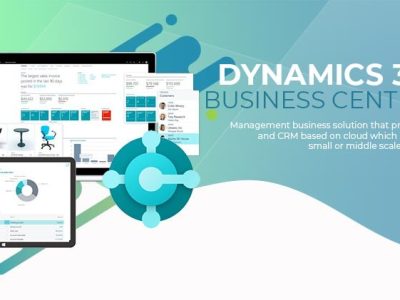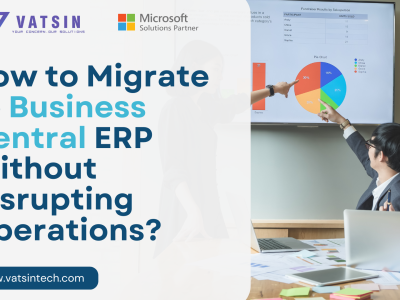In today’s fast-paced business landscape, staying competitive means embracing modern technology that drives efficiency, scalability, and innovation. For small to mid-sized businesses (SMBs), an outdated ERP system can create bottlenecks, hinder growth, and limit adaptability. This is where Dynamics 365 Business Central emerges as a game-changer. Migrating to Microsoft Business Central ERP offers a pathway to streamline operations, enhance collaboration, and fuel digital transformation. In this blog, we’ll explore why ERP Microsoft Business Central is the future of enterprise resource planning and how partnering with Microsoft Dynamics 365 implementation partners like Vatsin Technology Solutions can ensure a seamless transition.
The Need for Modern ERP Solutions
Traditional ERP systems, often on-premises, can become a liability as businesses evolve. These legacy systems may lack the flexibility to support remote work, integrate with modern tools, or adapt to changing regulations. Additionally, maintaining outdated infrastructure can drain resources, leaving businesses unable to focus on core activities. Microsoft Dynamics 365 addresses these challenges by offering a cloud-based ERP solution that unifies key business functions — finance, sales, operations, and customer service — into a single platform.
The shift to cloud-based ERP is not just a trend; it’s a necessity for digital transformation. A modern ERP like Dynamics 365 Business Central provides the agility to scale, the security to protect data, and the automation to reduce manual effort. For businesses still relying on older systems like Dynamics NAV or Dynamics GP, migrating to Microsoft Business Central ERP is a strategic move to future-proof operations.
Why Dynamics 365 Business Central Stands Out
ERP Microsoft Business Central is designed specifically for SMBs, offering a comprehensive suite of tools that connect every aspect of your business. Here’s why it’s considered the future of ERP:
1. Cloud-Based Flexibility and Accessibility
One of the most significant advantages of Dynamics 365 Business Central is its cloud-based architecture. Unlike on-premises systems that require substantial hardware investments, Microsoft Business Central ERP operates on Microsoft Azure, providing secure, anytime, anywhere access. Whether your team is in the office, working remotely, or on the go, they can access critical data through web browsers, smartphones, or tablets. This flexibility supports modern work models, ensuring your business remains agile in a dynamic environment.
The cloud also eliminates the burden of managing servers and infrastructure. Microsoft handles updates, security, and backups, ensuring your ERP Microsoft Business Central system is always current with the latest features and compliance standards. This allows your team to focus on growth rather than maintenance, a key pillar of digital transformation.
2. Seamless Integration with Microsoft 365
A standout feature of Microsoft Dynamics 365 is its deep integration with Microsoft 365 tools like Excel, Outlook, and Teams. Imagine accessing financial reports directly in Excel, managing customer interactions within Outlook, or collaborating on projects in Teams — all without switching applications. This connectivity reduces data silos, enhances productivity, and streamlines workflows, making Microsoft Business Central ERP a unified hub for your operations.
For businesses already using Microsoft 365, adopting ERP Microsoft Business Central feels intuitive. The familiar interface minimizes the learning curve, allowing employees to adopt the system quickly and focus on their core responsibilities. This seamless integration is a cornerstone of why Dynamics 365 Business Central is the future of ERP.
3. ERP Automation for Enhanced Efficiency
Manual processes can slow down operations and lead to errors, especially in areas like finance, inventory, and supply chain management. Dynamics 365 Business Central leverages ERP automation to eliminate repetitive tasks and improve accuracy. From automating accounting workflows to streamlining purchase orders, the system ensures your team spends less time on mundane activities and more on strategic initiatives.
Additionally, Microsoft Dynamics 365 incorporates AI-driven tools like Copilot, which can assist with tasks such as drafting content, summarizing data, or predicting customer payment delays. This level of automation not only boosts efficiency but also empowers data-driven decision-making, a critical aspect of digital transformation.
4. Scalability to Support Business Growth
SMBs need an ERP solution that can grow with them. Microsoft Business Central ERP offers unparalleled scalability, allowing you to start with essential features and expand as your needs evolve. Whether you’re adding new users, integrating third-party apps, or expanding into global markets, ERP Microsoft Business Central adapts seamlessly. Its subscription-based licensing model provides flexibility, letting you adjust user licenses without long-term commitments, ensuring cost-effectiveness as your business scales.
This scalability makes Dynamics 365 Business Central a future-proof choice. As your business grows, you can incorporate advanced modules for supply chain management, manufacturing, or customer service, all within the same platform, supporting your digital transformation journey.
5. Enhanced Security and Compliance
Data security is a top priority for businesses of all sizes. Microsoft Dynamics 365 Business Central, hosted on Azure, offers robust security features, including role-based access, Microsoft Entra ID authentication, and automatic datacenter encryption. These measures ensure that your data is protected against breaches while maintaining compliance with global regulations like GDPR.
By migrating to Microsoft Business Central ERP, you gain peace of mind knowing that your ERP system is backed by Microsoft’s world-class security infrastructure. This focus on security and compliance positions ERP Microsoft Business Central as a trusted solution for the future of ERP.
Benefits of Migrating to Dynamics 365 Business Central
For businesses still using legacy systems like Dynamics NAV or Dynamics GP, the transition to Dynamics 365 Business Central offers transformative benefits. Here’s why migration is a strategic move:
Modernized Operations
Older ERP systems often struggle to keep up with modern demands, such as remote access or real-time analytics. Microsoft Business Central ERP modernizes your operations by providing a cloud-based platform that delivers real-time insights into your financials, inventory, and customer interactions. This visibility enables faster, more informed decisions, helping your business stay competitive.
Cost Efficiency
Maintaining an on-premises ERP involves significant costs, from hardware upkeep to IT staff. Dynamics 365 Business Central reduces these expenses by operating on a subscription model, with Microsoft handling updates and infrastructure. This cost efficiency allows SMBs to allocate resources toward innovation and growth, a key driver of digital transformation.
Improved Collaboration
With ERP Microsoft Business Central, your teams can collaborate seamlessly across departments. The integration with Microsoft 365 ensures that finance, sales, and operations teams work from a single source of truth, reducing miscommunication and enhancing productivity. This collaborative environment is essential for businesses aiming to thrive in the future.
Future-Ready Features
Microsoft Dynamics 365 Business Central is continuously updated with new features, such as AI enhancements and compliance updates, ensuring your ERP system remains cutting-edge. By migrating, you gain access to tools like Copilot and Power BI, which provide predictive insights and advanced analytics, positioning your business for long-term success.
The Role of Microsoft Dynamics 365 Implementation Partners
Migrating to Dynamics 365 Business Central is a significant step, and partnering with the right experts can make all the difference. Microsoft Dynamics 365 implementation partners like Vatsin Technology Solutions bring the expertise needed to ensure a smooth transition. Here’s how they add value:
Tailored Migration Strategies
Every business has unique needs, and a one-size-fits-all approach to ERP migration can lead to disruptions. Microsoft Dynamics 365 implementation partners assess your current systems, processes, and goals to create a tailored migration plan. This ensures that your transition to Microsoft Business Central ERP aligns with your business objectives, minimizing downtime and maximizing efficiency.
Seamless Data Migration
Data migration is often a concern when upgrading ERP systems. Experienced Microsoft Dynamics 365 implementation partners use proven tools and methodologies to migrate your data from legacy systems like Dynamics NAV to ERP Microsoft Business Central. They address potential issues proactively, ensuring your data remains intact and accessible throughout the process.
Training and Support
Adopting a new ERP system requires training to ensure your team can use it effectively. Microsoft Dynamics 365 implementation partners provide comprehensive training, helping your employees navigate Dynamics 365 Business Central with confidence. They also offer ongoing support to address any challenges, ensuring long-term success.
Customization and Integration
While Microsoft Business Central ERP offers robust out-of-the-box features, your business may require customizations or integrations with third-party apps. Microsoft Dynamics 365 implementation partners can extend the system’s functionality through AppSource extensions, ensuring it meets your specific needs without complicating future updates.
At Vatsin Technology Solutions, we pride ourselves on being trusted Microsoft Dynamics 365 implementation partners, guiding SMBs through every step of their ERP journey. From migration to optimization, we’re here to help you unlock the full potential of ERP Microsoft Business Central.
Overcoming Common Migration Concerns
Migrating to a new ERP system can feel daunting, but with the right approach, it’s a rewarding investment. Here are some common concerns and how Dynamics 365 Business Central addresses them:
Complexity of Migration
The thought of migrating data and processes can seem overwhelming. However, Microsoft Business Central ERP offers robust migration tools, and with the support of Microsoft Dynamics 365 implementation partners, the process becomes manageable. A phased approach — starting with core features and expanding later — can further simplify the transition.
Learning Curve
Adopting a new system often comes with a learning curve. ERP Microsoft Business Central mitigates this with its intuitive interface and integration with familiar Microsoft 365 tools, making it easier for employees to adapt. Training from partners like Vatsin ensures your team is equipped to use the system effectively.
Cost Considerations
While migration involves an initial investment, Microsoft Dynamics 365 Business Central’s subscription model and cloud infrastructure reduce long-term costs. The efficiency gains from ERP automation and improved workflows often outweigh the upfront expenses, making it a cost-effective choice for SMBs.
Why Now Is the Time to Migrate
The ERP landscape is evolving rapidly, and delaying your migration could put your business at a disadvantage. With legacy systems like Dynamics NAV nearing the end of mainstream support, transitioning to Dynamics 365 Business Central ensures you stay compliant, secure, and competitive. The 2025 Release Wave 1 updates for Microsoft Dynamics 365 introduce new AI capabilities and enhanced integrations, making now the perfect time to upgrade.
Moreover, the growing demand for cloud-based solutions means that businesses not adopting Microsoft Business Central ERP may struggle to keep pace with competitors. By migrating, you position your business to leverage modern technologies like AI, machine learning, and real-time analytics, all of which are integral to the future of ERP.
Conclusion: Embrace the Future with Dynamics 365 Business Central
Migrating to Dynamics 365 Business Central is more than a technical upgrade — it’s a strategic decision that sets your business up for long-term success. With its cloud-based flexibility, seamless integrations, ERP automation, and scalability, Microsoft Business Central ERP is the future of ERP for SMBs. By partnering with Microsoft Dynamics 365 implementation partners like Vatsin Technology Solutions, you can ensure a smooth transition and maximize the value of your investment.
Ready to transform your operations with ERP Microsoft Business Central? Contact Vatsin Technology Solutions at https://vatsintech.com/contact to schedule a free consultation. Let’s build a future-ready business together!







